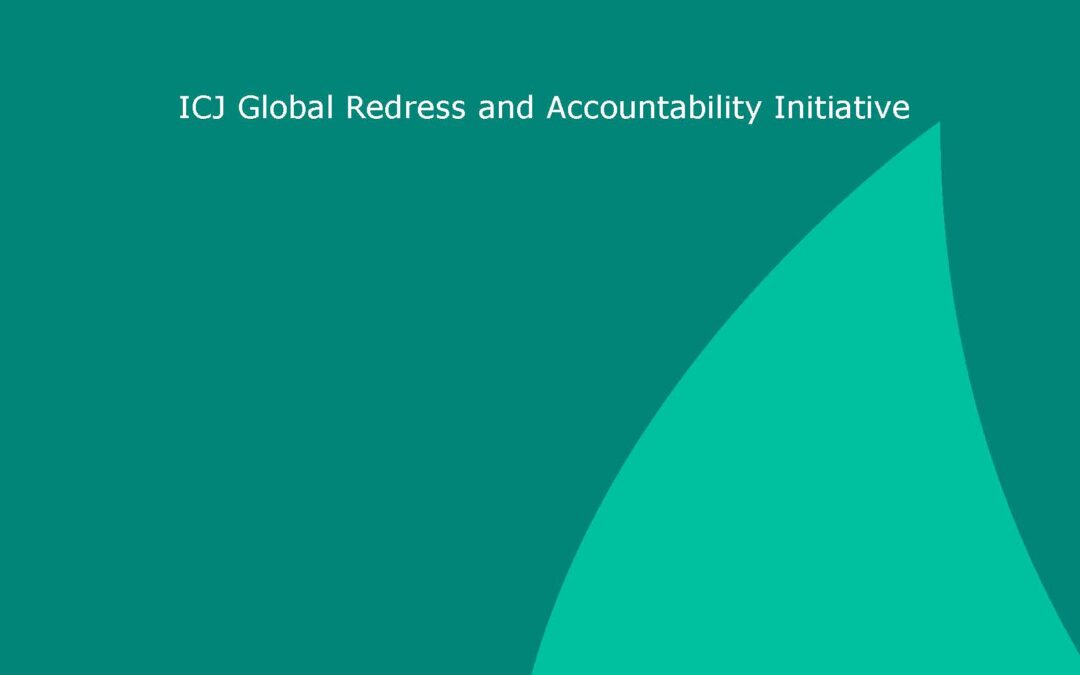
Nov 1, 2017 | News, Publications, Reports, Thematic reports
The arrest of absconding murder convict Bal Krishna Dhungel, a senior Maoist leader, highlights the weaknesses, as well as the promises, for victims seeking accountability through Nepal’s judicial system, said the ICJ as it released a report on accountability mechanisms in the country.
The ICJ’s report Achieving Justice for Gross Human Rights Violations in Nepal concludes that impunity for gross human rights violations is one of the major obstacles to the creation of a stable and legitimate democratic government and lies at the heart of the rule of law crisis in Nepal.
It found that a lack of commitment by Nepal’s political leadership to address past and ongoing human rights violations continues to allow perpetrators to escape justice and undermines victims’ right to effective remedies and reparation.
“In the past, the promise to shield perpetrators for human rights violations has been used as a bargaining chip to garner political support and build political alliances,” said Frederick Rawski, Director of the ICJ’s Asia Pacific Regional Programme.
“It is imperative that accountability for human rights violations remains a priority for Nepal’s political leadership after Parliamentary elections, and that alliances between political parties are not once again used as an excuse to undermine Nepal’s human rights obligations,” added Rawski.
Attempts to thwart justice have also included the cynical manipulation of justice sector actors, from the police to the Attorney General’s office, in a way that threatens the independence and credibility of the institutions responsible for safeguarding human rights and the rule of law in Nepal, the report highlights.
This pattern of impunity persists despite demands for accountability by civil society and victims’ organizations, as well as the National Human Rights Commission and Nepal’s Supreme Court.
“In many ways, the Supreme Court of Nepal has emerged as a beacon of hope for victims of human rights violations,” said Rawski.
“The Court has given domestic effect to Nepal’s obligations under international law and has set high standards for accountability, remedy and reparations,” he added.
However, the Government’s disregard of key judgments has limited the impact of the Supreme Court’s jurisprudence, the report says.
Attacks on the independence of the judiciary, as demonstrated by the impeachment motion against former Chief Justice Sushila Karki, also indicate a worrying trend.
The ICJ’s report found that the mandate and operation of transitional justice mechanisms fall short of international standards despite the repeated reinforcement of such standards by the Supreme Court.
Though ostensibly formed to provide a measure of public accountability, the practice of forming ad hoc commissions of inquiry to investigate rights violations has promoted impunity by diverting investigations from the criminal justice process – where they belong – into parallel mechanisms that are established by means that make them vulnerable to political interference and manipulation.
The ICJ’s report also concludes that gross human rights violations in Nepal are not a thing of the past, but are ongoing.
Notably in the Terai region, the State has responded to the Madhesh movement with excessive use of force, extrajudicial killings, and torture and other ill-treatment.
Political expediency has trumped calls for justice and accountability and the Government continues to use State machinery to shield perpetrators rather than serve the interests of justice.
“In a seemingly perpetual cycle, the weak rule of law in the country contributes to impunity for human rights violations, and this culture of impunity further erodes the rule of law,” said Rawski.
“The search for truth and justice in Nepal will not be realized unless this cycle is ended,” he added.
Additional information
Dhungel had been absconding since the Supreme Court upheld his conviction for murder in 2010. The arrest comes after a contempt of court petition was filed before the Supreme Court against the Inspector General of Police for failing to implement multiple Supreme Court orders directing Dhungel’s arrest.
Contact
Frederick Rawski, ICJ Asia Pacific Regional Director, t: +66 64 478 1121, e: frederick.rawski@icj.org
Alex Conte, ICJ Global Redress and Accountability Initiative, t: +41.79.957.2733; e: alex.conte@icj.org
Download
Nepal-GRA Baseline Study-Publications-Reports-Thematic reports-2017-ENG (full report in PDF)
Read also
ICJ Discussion Paper Nepal’s Transitional Justice Process: Challenges and Future Strategy (August 2017)
ICJ Report Authority without Accountability: The struggle for justice in Nepal (October 2013)
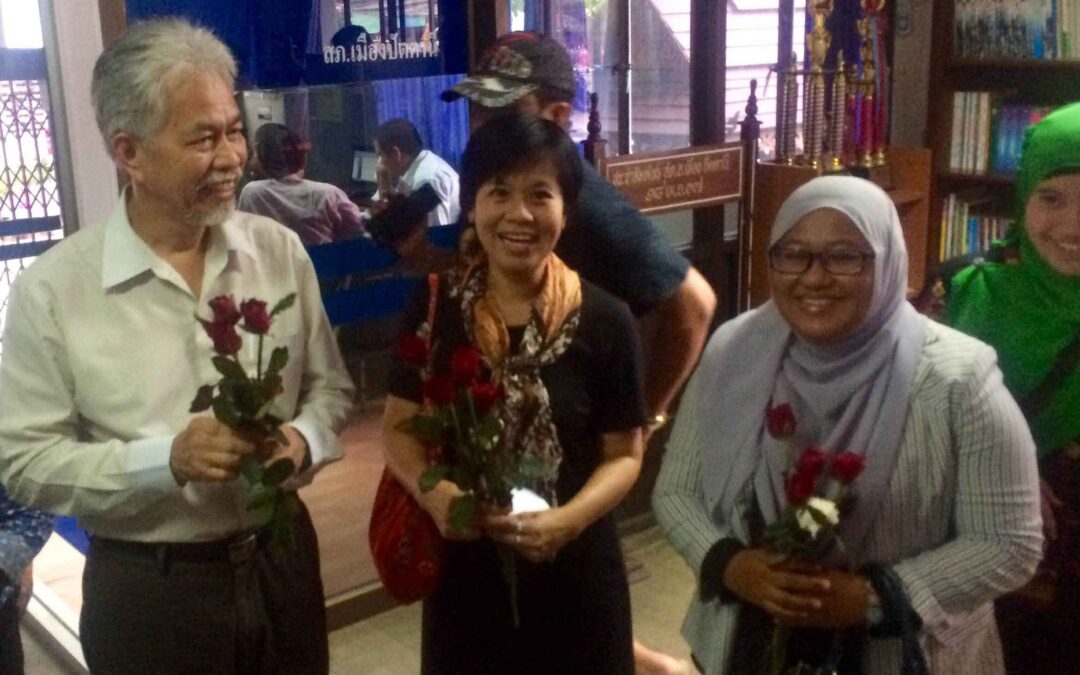
Nov 1, 2017 | News
The ICJ welcomes the Pattani Provincial Prosecutor’s decision to end the criminal prosecution of three prominent human rights defenders who raised allegations of torture in Thailand’s restive deep South: Ms Pornpen Khongkachonkiet, Mr Somchai Homlaor, and Ms Anchana Heemmina.
On 24 October 2017, the Region 9 Senior Expert Public Prosecutor, on behalf of the Pattani Provincial Prosecutor, informed the Superintendent of the Muang District Pattani Police Station of the decision to end the prosecution of the three defenders for criminal defamation and violation of the Computer Crime Act.
The ICJ has previously expressed concern that the prosecutions were unwarranted and abusive and were aimed at chilling the exercise of critical human rights work in Thailand.
“While we welcome the decision to end these prosecutions, they have already caused a tremendous amount of damage to complainants of serious human rights violations like torture and ill-treatment, civil society, and the local community in the deep South that must now be repaired,” said Kingsley Abbott, the ICJ’s Senior International Legal Adviser for Southeast Asia.
“An important first step would be to pass legislation which criminalizes torture and ill-treatment and provides meaningful protections for those who wish to come forward with allegations of violations,” he added.
On 28 February 2017, the UN Office of the High Commissioner for Human Rights announced that it had been informed that the Thai National Legislative Assembly (NLA) would not enact legislation then under consideration criminalizing torture and enforced disappearance, the Draft Prevention and Suppression of Torture and Enforced Disappearance Act (Draft Act).
The following day, an NLA official speaking to BBC Thai confirmed that the Draft Act would be “returned [to the Thai Cabinet] for more consultations… with Interior officials, police authorities, the national security sector, military authorities and prosecutors.”
The Draft Act remains with the Thai Cabinet.
“It is long past time for Thailand to make good on its repeated commitments on the international stage to pass this essential piece of legislation in accordance with its international human rights obligations,” added Abbott.
Contact
Kingsley Abbott, Senior International Legal Adviser, ICJ Asia Pacific Regional Office, t: +66 94 470 1345, e: kingsley.abbott(a)icj.org
Background
On 10 February 2016, three Thai organizations, the Cross Cultural Foundation (CrCF), Duay Jai Group (Hearty Support Group), and the Patani Human Rights Organization (HAP), issued a report that documented 54 cases of alleged torture and ill-treatment by the Thai security forces in the deep South since 2004.
In response, the Internal Security Operations Command (ISOC) Region 4 (Forward Command) – created to resolve the situation in the deep South – made complaints of criminal defamation against the three co-editors, Pornpen Khongkachonkiet (Director of the CrCF), Somchai Homlaor (Senior legal advisor to CrCF and Hearty Support Group), and Anchana Heemmina (founder and Director of the Hearty Support Group).
On 26 July 2016, the Thai police charged the three defenders with criminal defamation by means of publication under Article 326 and 328 of the Penal Code, and importing false information to a computer system under Article 14 (1) of the Computer-Related Crime Act B.E. 2550 (2007).
On 7 March 2017, the ISOC 4 Forward Command announced its intention to drop the complaints at a press conference in Bangkok.
Thailand is a State party to the International Covenant on Civil and Political Rights (ICCPR), the Convention against Torture and other Cruel, Inhuman or Degrading Treatment or Punishment (CAT) and has signed, but not yet ratified, the International Convention for the Protection of All Persons from Enforced Disappearance (ICPPED).
Further reading on these criminal proceedings
Thailand: ICJ welcomes dropping of complaints against human rights defenders but calls for investigation into torture
Thailand: stop use of defamation charges against human rights defenders seeking accountability for torture
Thailand: immediately withdraw criminal complaints against human rights defenders
Further reading on the Draft Prevention and Suppression of Torture and Enforced Disappearance Act
Thailand: ICJ commemorates international day in support of victims of enforced disappearances
Thailand: pass legislation criminalizing enforced disappearance, torture without further delay
Thailand-News-Pressreleases-humanrightsdefenders-2017-THAI (full press release in Thai, pdf)
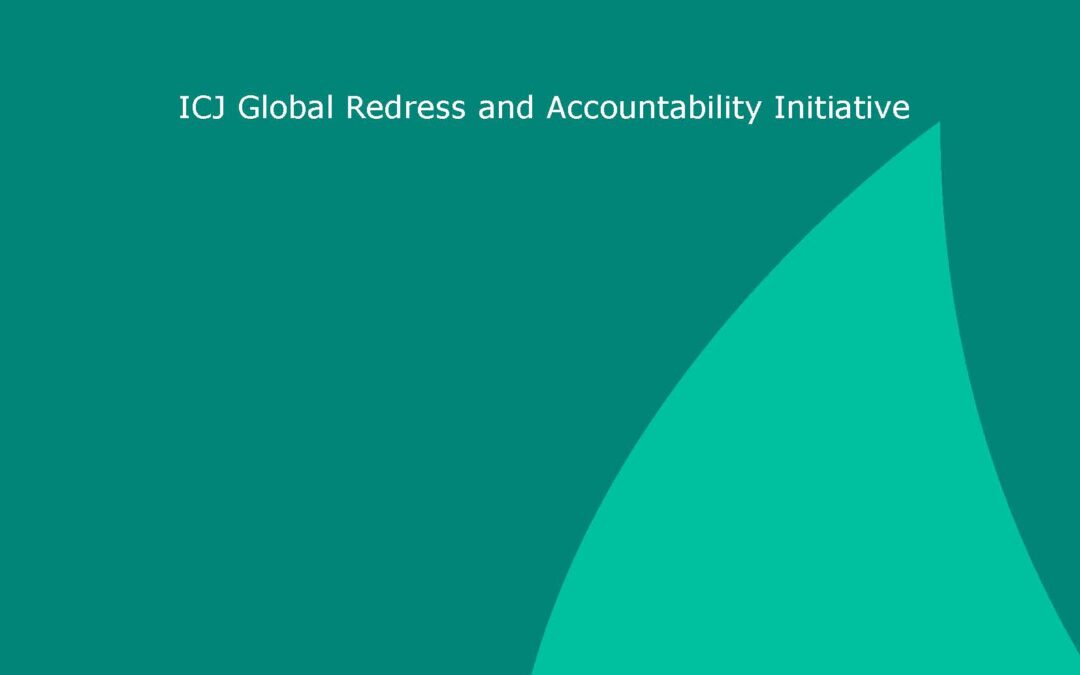
Oct 31, 2017 | Доклады, Новости, Пресс-релизы, Публикации, Тематические доклады
Сегодня МКЮ опубликовала доклад, в котором пришла к выводу о необходимости принять эффективные меры по борьбе с безнаказанностью за пытки в ходе содержания под стражей для борьбы с систематической практикой использования пыток и иных видов жестокого обращения с заключенными в Таджикистане.
В докладе МКЮ, озаглавленном «Обеспечение правосудия в случаях грубых нарушений прав человека в Таджикистане», делается следующий вывод: хотя уголовно-процессуальное законодательство Таджикистана часто соответствует международному праву, в том числе гарантиям в области справедливого судебного разбирательства и иным относимым гарантиям, на практике это не обеспечивает эффективной защиты прав человека.
В действительности существующая система неспособна исправить серьезные нарушения прав человека, которые систематически имеют место в ходе содержания под стражей, а также обеспечить привлечение к ответственности виновных.
Даже когда подаются жалобы на пытки, представляется, что лишь в редких случаях они приводят к проведению расследования, уголовному преследованию и осуждению виновных.
«Систематическое использование пыток и жестокого обращения в ходе содержания под стражей подрывает авторитет системы уголовного правосудия в Таджикистане, а также понятия справедливости и правосудия и действие принципа верховенства закона в стране», – отметил Тимур Шакиров, старший правовой советник Региональной программы МКЮ по Европе.
«Пытки всегда следует рассматривать как одно из самых тяжких преступлений. По международному праву в области прав человека, жалобы на пытки должны быть предметом независимого, безотлагательного и тщательного расследования, а при установлении личности виновных они должны предстать перед судом», – добавил Тимур Шакиров.
Согласно выводам доклада, для борьбы с систематической практикой использования пыток и иных видов жестокого обращения в ходе содержания под стражей необходима эффективная система предупреждения данных методов воздействия, а также система возмещения ущерба, причиненного в результате допущенных нарушений.
В докладе МКЮ выделен целый ряд факторов, которые способствуют широкомасштабному использованию пыток и иных видов жестокого обращения в Таджикистане, в том числе -отсутствие независимости у судебных органов; неспособность судей обеспечить равенство сторон защиты и обвинения; частые отказы судов исследовать заявления защиты о пытках и иных видах жестокого обращения; склонность судов безоговорочно принимать доводы стороны обвинения, отрицающей применение данных методов; а также регулярные отказы судов признать недопустимыми доказательства, полученные под пыткой.
Принцип презумпции невиновности по большей части остается иллюзорным, так как судьи активно используют признательные показания подозреваемых, полученные в первые часы содержания под стражей.
В докладе также показывается, что отсутствие гарантий конфиденциальности свиданий заключенного с адвокатом не позволяет заключенным эффективно осуществлять свое право на квалифицированную юридическую помощь и при необходимости обжаловать жестокое обращение.
«Искоренения систематической практики пыток можно добиться лишь в том случае, если отдельные адвокаты и институт адвокатуры в целом будут независимы от исполнительных органов власти, будут пользоваться защитой при исполнении своих профессиональных обязанностей, а также свободным доступом к подзащитным уже в первые часы их содержания под стражей, как этого требует международное право и соответствующие стандарты», – подчеркнул Тимур Шакиров.
В докладе представлен исчерпывающий перечень рекомендаций, подготовленных по итогам подробного анализа действующего законодательства и правоприменительной практики Таджикистана, в том числе на основании выводов и рекомендаций различных органов системы ООН по защите прав человека.
Контакты:
Тимур Шакиров, правовой советник Региональной программы МКЮ по Европе, т: +41.22.979.3832; e: temur.shakirov(a)icj.org
Алекс Конте, Глобальная Инициатива по Восстановлению и Подотчетности, т:+41.79.957.27.33, e: alex.conte(a)icj.org
Tajikistan-GRA Baseline Study-News-Press-Release-2017-RUS (Полная история на русском)
Скачать Доклад:
Tajikistan-GRA Baseline Study-Publications-Reports-Thematic reports-2017-ENG (Английский)
Читайте также:
ICJ Report ICJ Recommendations on the Independence of the Legal Profession in the Republic of Tajikistan (February 2016)
ICJ legal submission Alternative Report to the UN Human Rights Committee on the Second Periodic Report of Tajikistan under the International Covenant on Civil and Political Rights (June 2013)
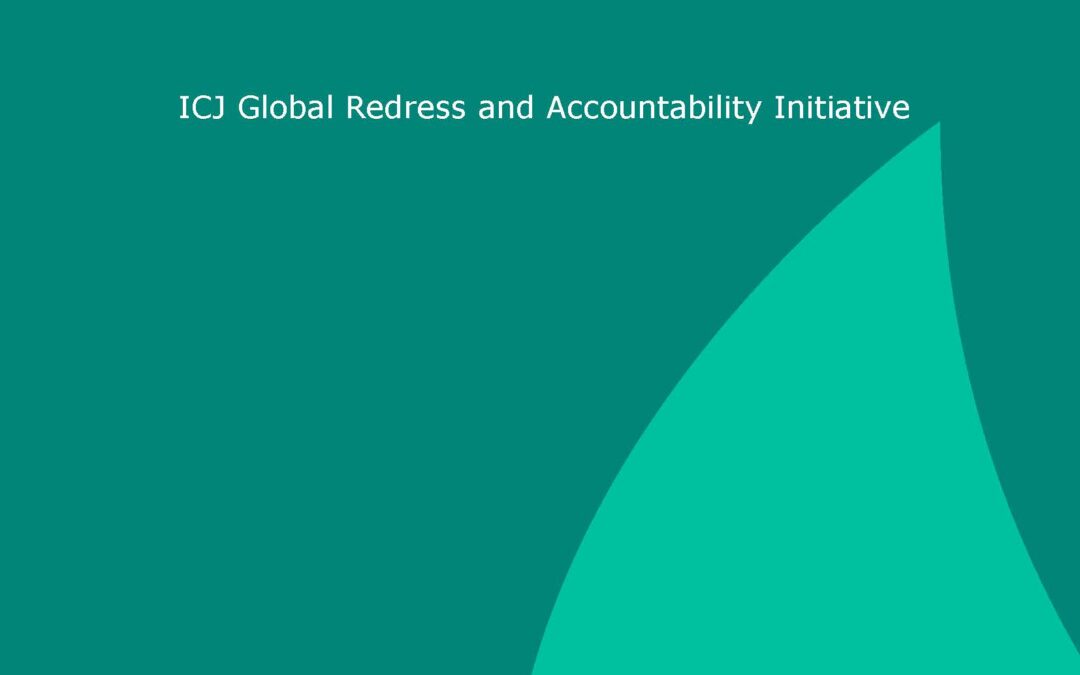
Oct 31, 2017 | News, Publications, Reports, Thematic reports
Effective measures to end impunity for crimes of torture in detention are needed to tackle the systematic recourse to torture and other ill-treatment of detainees in Tajikistan, the ICJ concluded in a report released today.
The ICJ report, Achieving Justice for Gross Human Rights Violations in Tajikistan, finds that although Tajikistan’s criminal procedure law is often in line with international law, including fair trial and other relevant guarantees, in practice it does not lead to effective protection of human rights.
The system is in practice unable to remedy or establish accountability for the serious human rights violations that occur systematically in detention, the report says.
Even where complaints of torture are made, it appears that very few lead to investigation, prosecution or conviction.
“The systematic recourse to torture and ill-treatment in detention undermines the integrity of the criminal justice system in Tajikistan, as well as notions of fairness and justice and the operation of the rule of law in the country,” said Temur Shakirov, Senior Legal Adviser at the ICJ’s Europe Regional Programme.
“Torture must always be treated as one of the most serious crimes. International human rights law requires that allegations of torture must be independently, promptly and thoroughly investigated and, where those responsible are identified, they must be brought to justice,” added Shakirov.
An effective system of prevention of torture and other ill-treatment in detention and for the provision of effective remedies and reparation for such violations is needed to tackle the systematic recourse to their use, the report finds.
The ICJ’s report identifies numerous factors that foster the widespread use of torture and other ill-treatment in Tajikistan, including:
- the lack of independence of the judiciary;
- the judges’ failure to uphold equality of arms between the defence and prosecution;
- the frequent failure by courts to inquire into allegations of torture or other ill-treatment raised by the defence;
- the tendency of courts to accept prosecution denials of such treatment without question; and
- courts’ regular failure to exclude evidence obtained by torture.
With heavy reliance by judges on self-incriminating statements made by suspects in the first hours of detention, the presumption of innocence remains to a large extent illusory, the report adds.
The report also demonstrates that a lack of guarantees for confidential lawyer-detainee meetings prevents detainees from effectively exercising their right to qualified legal assistance and to complain about ill-treatment if necessary.
“Systemic torture cannot be effectively eradicated unless lawyers are both individually and institutionally independent of the executive, are protected in carrying out their duties, and have unimpeded access to their clients in the first hours of detention, as required by international law and standards”, Shakirov said.
The report provides a comprehensive list of recommendations following a detailed analysis of applicable laws and practices in Tajikistan, including based on the findings and recommendations of different bodies of the United Nations human rights system.
Contact
Temur Shakirov, Senior Legal Adviser, Europe Programme, t: +41.22.979.3832; e: temur.shakirov(a)icj.org
Alex Conte, ICJ Global Redress and Accountability Initiative, t: +41.79.957.2733; e: alex.conte(a)icj.org
Tajikistan-GRA Baseline Study-News-Press-Release-2017-RUS (Press Release, Russian PDF)
Download
Tajikistan-GRA Baseline Study-Publications-Reports-Thematic reports-2017-ENG (full report in PDF, English)
Read also
ICJ Report ICJ Recommendations on the Independence of the Legal Profession in the Republic of Tajikistan (February 2016)
ICJ legal submission Alternative Report to the UN Human Rights Committee on the Second Periodic Report of Tajikistan under the International Covenant on Civil and Political Rights (June 2013)
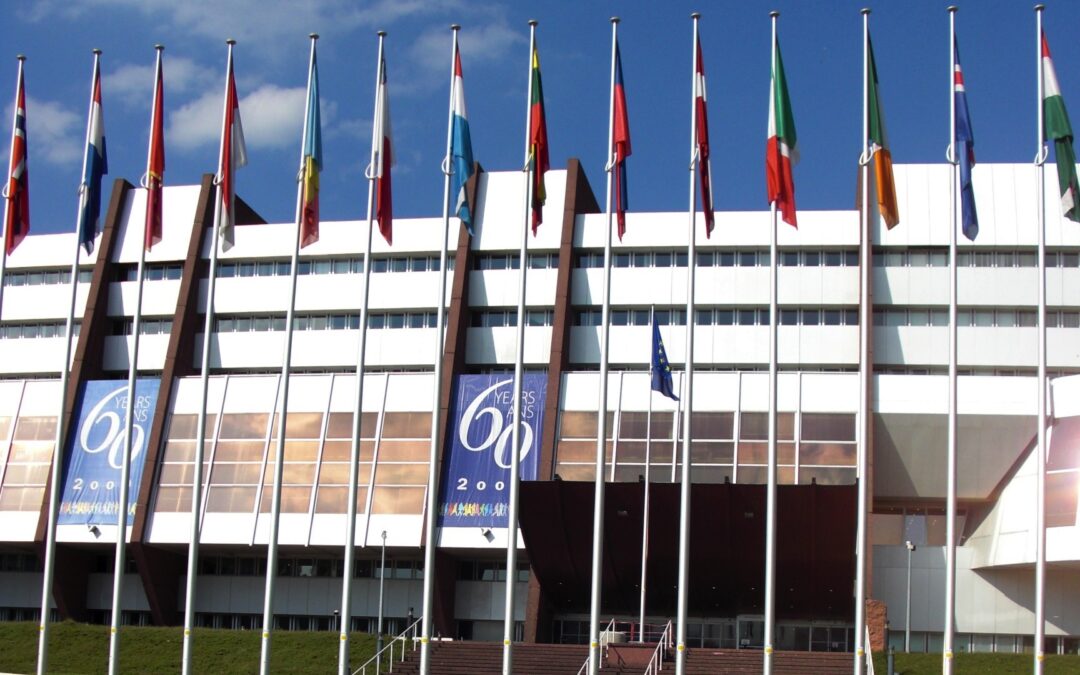
Oct 31, 2017 | Адвокаси, Юридические заявления
МКЮ представила документ о системах выдачи, высылки и похищений Российской Федерации в Комитет министров Совета Европы.
Документ был представлен для рассмотрения Комитета министров Совета Европы по вопросу об осуществлении Российской Федерацией ряда постановлений Европейского суда по правам человека в группе дел «Гарабаев против России» и других.
В частности, МКЮ представила свои последние выводы в докладе «Транснациональная неправосудность – перемещение лиц по соображениям национальной безопасности», в которых представлена самая последняя оценка систем екстрадиции, высылки и похищения/выдачи Российской Федерации и государств в Центральной Азии по сравнению с закономи и практикой в этой области государств-членов ЕС и системы выдачи США.
Представление МКЮ относится к отсутствию соблюдения Российской Федерацией постановлений Европейского Суда по правам человека в отношении соблюдения принципа невыдворения (статьи 3 ЕКПЧ), отсутствие эффективного средства правовой защиты от нарушений этого принципа (статья 3 и 13 ЕКПЧ), а также отсутствие соблюдения временных мер Суда (статья 34 ЕКПЧ).
Russian Federation-Garabaev-Transfer-Shortcomings-Advocacy-Legal submissions-2017-ENG (Скачайте документ на английском)








